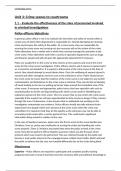Criminology unit 3
Unit 3: Crime scenes to courtrooms
1.1 – Evaluate the effectiveness of the roles of personnel involved
in criminal investigations
Police officers/detectives
In general, police officer’s role is to maintain the law/order and safety of society within a
certain area of which their department is responsible for. Overall attempting to minimise
crime and increase the safety of the public. At a crime scene, they are responsible for
securing the crime scene and carrying out any necessary aid on the victims of the crime.
Police detectives have a similar role in which they oversee/manage the operation at the
crime scene. Police detectives work with a variety of specialist departments such as drugs
and firearms squads and will call upon the appropriate department if necessary.
Police are usually first on the scene so they need to arrest suspects and secure the crime
scene for the crime scene investigators. Police officers need to see if anyone is injured and if
so, is cared for and tended to. If a suspect is still present at the crime scene at the time of
arrival, they should attempt to arrest/detain them. Once the wellbeing of anyone injured is
ensured and other emergency services such as the ambulance arrive. Police should secure
the crime scene to ensure that the evidence at the crime scene is not subject to any further
contamination and disturbance to the crime scene is minimal. They may do this by blocking
off roads leading to the area or putting up barrier tapes around the immediate area of the
crime scene. If necessary and appropriate, police forces also have specialist units such as
mounted police to do this and dog handling units which can be used for identifying any
substances present at the crime scene. This is to ensure that no one enters the crime scene
especially if the suspect has not been apprehended as they may be in danger if they crossed
through the area. Furthermore, it also ensures that no individuals not working on the
investigation contaminate any evidence. Police officers should also take witness/victim
statements from people which were present at the crime scene when the crime was
committed. It is important that they do this quickly as the witnesses may not be able to
accurately recall events after a certain period of time. This could lead to significant
information being missed in relation to the case.
In the case of Stephen Lawrence, police were the first to arrive at the scene besides two
Christians. Even so, police were ineffective at serving the victim and handling the crime
scene properly. These 2 Christians had stated that when the police arrived at the crime
scene, they did not perform CPR on Stephen Lawrence which was the first part of the
protocol which was meant to be performed. This was criticised heavily by the public and
became a main public interest in the campaign known as Black Lives Matter (BLM) and lead
the public to believe that the case was handled differently due to the victim being black.
Effectiveness
Expertise – Police officers are required to participate and complete specific training
programs/exercises to ensure that they have the necessary skills and sufficient knowledge in
, Criminology unit 3
order to carry out their role. This would involve knowing the procedure of how to properly
secure a crime scene and how to perform life saving measures on an injured victim if
necessary. Police detectives often possess years of experience as they would have worked
up the chain to gain their title and authority. Alongside this they liaise with specialist
departments during an investigation of a crime scene.
Cost - The starting salary for police officers in the Uk is roughly £21,000. In general, the
average salary is roughly £26000 and can rise to roughly £41,000 as the individual rises up
the chain and gains more experience. This salary is achievable after roughly 7 years of
service. In Scotland the starting salary is £26,000 and can rise to roughly £41,000 also after
10 years of service.
Availability - Police have a wide availability with there being roughly 140,000 police officers
across the 43 police forces in the UK in 2022, every person is able to call the police at any
time through their respective emergency phone numbers. Police officers work on an on-call
basis 24/7 just like CSIs, this is because a crime could happen at any time throughout the
day and police officers must provide assistance to the caller as soon as possible.
Furthermore, the quicker the police officers get to a crime scene, the more likely they are to
find and apprehend a suspect. However, if multiple calls were received at the same time,
priority would most likely go to the most serious one. Likewise, if the police officers are
already securing a crime scene or in the process of the responding/tending to a serious
crime the caller may have to wait a longer time for police to reach them. This may lead to
police being overworked and overstretched through communities which could lead to a
crime being unattended to and communities being vulnerable.
Limitations
Police could fail to secure a crime scene adequately if the procedure is not followed
properly, this could result in contamination of evidence and could significantly affect
the case in court.
Police have been criticised by the public in the past for their discriminatory
behaviour in how they handle certain investigations such as hate crimes. The
metropolitan police have also been found to have an issue of institutional racism in
the past and handle cases with personal bias.
Crime scene investigator
A crime scene investigators role (CSI) is to identify, collect and preserve evidence from a
crime scene. Their main role is to ensure that the evidence present at a crime scene is
collected correctly/safely and not end up being contaminated. This is because if evidence
such as fingerprints or clothing collected from the crime scene were contaminated it would
be classed as inadmissible in court. An example of where this occurred was within the
Amanda Knox case in which a knife was not sealed properly. In addition to this, police failed
to wear the correct protective equipment when collecting evidence from the crime scene
leading to contaminated DNA samples.





